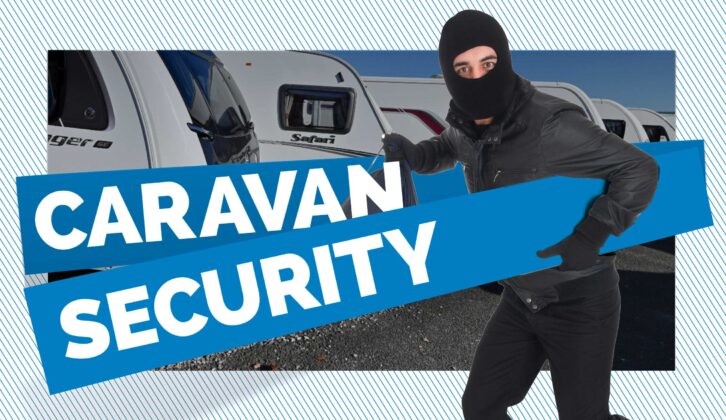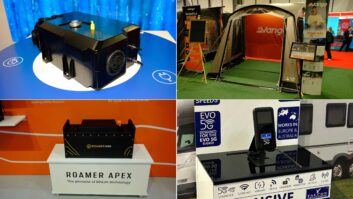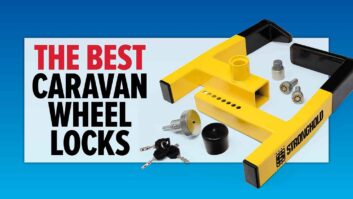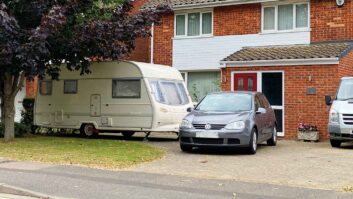Caravan security has never been more important, with enterprising criminals constantly on the lookout for tourers that can be targeted.
The combined effects of Brexit, Covid, war, silicon chip shortages and the energy crisis have resulted in a distinct scarcity of tourers and parts. Combine the continuing high demand for vans with the prices they can get for selling on stolen caravans and parts and there’s currently a far greater incentive for them to target leisure vehicles.
As well as stealing entire caravans, though, thieves can also purloin items from your van. Caravans are an appealing target because they often carry more in the way of high-value equipment than cars, like caravan TVs. Then, once inside – with the blinds down – thieves can rifle at their leisure.
In many ways, the theft of items from inside your tourer is a more insidious crime than the whole van disappearing – it’s as if somebody has violated your home space. This can be
a deeply disturbing experience. As a result, finding out what you can do to improve your caravan security and help to keep your tourer safe has never been more important.
Who is stealing vans?
It’s quite difficult to describe the typical caravan thief, but specialist law enforcement teams dealing with stolen vehicle recovery often focus on gangs of professional thieves, who are highly specialised and have connections to organised crime across Europe.
To be frank, there’s not much you can do to stop professional thieves taking your caravan. They will operate very rapidly and very effectively. With a bit of care, though, you can add
a few items that will at least hinder their progress, and potentially totally put off the more casual criminal.
What free options are there to improve my caravan security?
In these cash-strapped times, we’re all keen to save a bit of money wherever we can, so what can you do to help prevent caravan theft?
One of the easiest things is to always make sure you park up with your hitch-head facing away from the road (this is much easier if you have a motor mover). That makes
it more difficult for thieves to simply tow the van away.
Theft of items from caravans is often carried out by pesky opportunists, who tend to be serial offenders undeterred by the prospect of community service or a bit of prison time.
To discourage them, don’t leave anything on show and don’t advertise the contents of your caravan by having any stickers on the outside.
Security devices to use on a caravan
Physical caravan security devices
The main drawback with any physical security devices is that they’re only ever going to be as strong as the item to which they have been bolted. Thieves have no qualms about breaking extra locks and the piece of caravan that they’re attached to.
Your van is also surrounded on all sides by plastic windows, often fitted with plastic catches, which means gaining access isn’t going to be that tricky.
What all security devices do is to deter thieves and slow them down. They won’t make much odds to the professionals – this is their full-time job and they deal with this kind of kit every day. However, they do provide an excellent visual deterrent, which can be enough to put many thieves off.
Caravan wheel locks come in all shapes and sizes, but one of the most popular is the Al-Ko Secure wheel lock.
This device is smaller than most wheel locks, so it’s a lot easier to transport. The receiver is fixed to the van’s chassis, so it’s a more secure option.
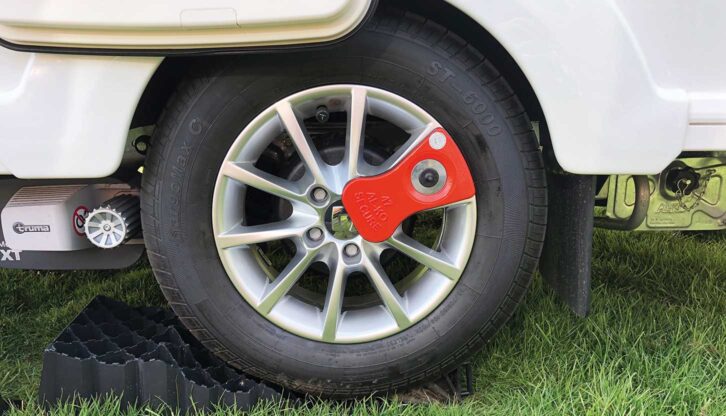
When fitted, the lock receiver is visible behind the wheel and the device slides between the wheel ‘spokes’ before the bolt is screwed into the receiver.
Aside from Al-Ko Secure, a wide range of wheel locks is available, from brands such as Milenco, Bulldog, Maypole and Fullstop.
These devices don’t require a prefitted receiver, are often cheaper, and if you have a twin-axle, are much easier to fit – aligning two wheels to the perfect spoke position can be quite a tricky procedure with an Al-Ko Secure lock.
Most tend to clamp around the wheel in a similar fashion, to prevent the caravan from being towed. These clamps are generally a lot bigger, and will require storage space in an external locker or your car.
Then there are steady locks. Quick and easy to use and store, these simple locks will increase the hassle level for any would-be thief, simply by locking the corner steadies in the lowered position, making it impossible to tow the van.
The best caravan hitch locks, meanwhile, are a compact, fairly light security device, and like wheel locks, are considered to be the bare minimum provision by many leisure vehicle insurers.
If you’re wondering what a hitch lock is, it clamps and locks around the hitch-head, preventing a towball from being inserted into the hitch. Simple to put in place, hitchlocks are also easy to store in a front locker, so they’ll always be ready to hand whenever needed.
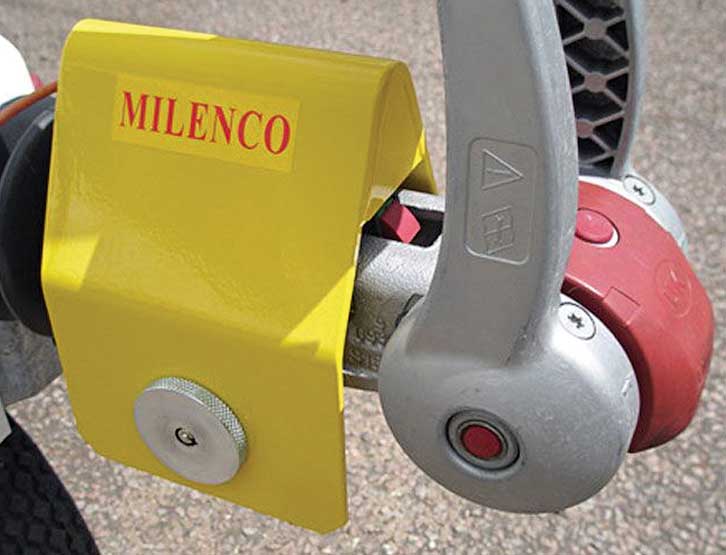
Along with a hitchlock, it’s advisable to fit a wheel lock where it’s highly visible. In fact, the more deterrents you have fitted, the better.
You could also go for a security post – these are a cheap and relatively effective defence or deterrent against ‘tow-away’ thefts for storing a caravan at home.
Position your caravan on the drive and lock the post in position behind it. They’re quick to use, although it has to be said that professional thieves can sometimes remove them pretty rapidly. But again, as a deterrent, they might just convince passing opportunists to move on elsewhere.
Security posts usually come in bolt-down or concrete-in designs, the former type being easier to fit, but potentially less secure than the latter.
With all mechanical security gear, you should be sure to pick a unit that is convenient to use. If your caravan is kept locked up like Fort Knox, it might spoil your use of it and put you off touring regularly. As with most things, this is a balancing act.
The best source of advice is the independent leisure vehicle press (which you’re reading), or groups such as Thatcham and Sold Secure, who test and rate security products.
Trackers
We’re great fans of caravan trackers, because they are an excellent, non-invasive way of keeping tabs on your caravan.
As well as being able to monitor if the van moves, trackers usually have alerts to warn of towing, vibration and whether the tourer has been jolted. So they will also alert you if somebody bumps into your van in your absence.
In addition, trackers allow you to remotely monitor your battery voltage, so you’ll know if your caravan battery needs charging. This is really helpful if you store your van remotely – you can see if the battery requires topping up by tapping through the app on your phone.
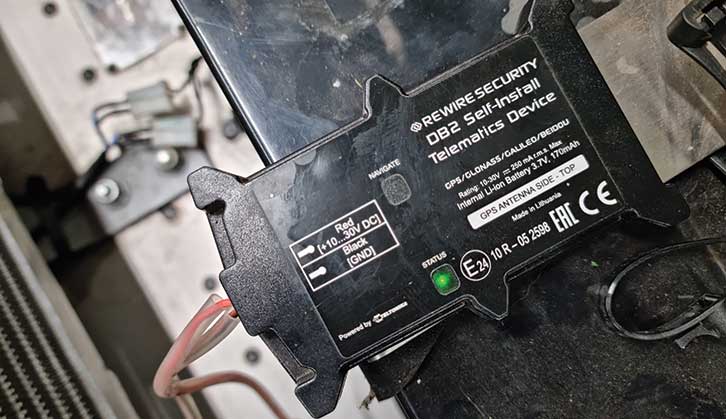
Trackers come in various forms, including app-based ones that will contact your mobile (these require a SIM card, provided by the supplier), which start at around £200,
and full-on systems with staffed tracking centres, which are available from about £500.
Not all trackers are accurate enough for the police to locate your caravan (and not all police forces have the capacity to investigate vehicle theft), so bear this in mind with potential purchases. If it is safe to do so, you might find that you have to recover the caravan yourself.
But a tracker can alert you rapidly of theft, and it’s this speed of response that can be critical to recovery.
Alarms
Factory-fitted alarms might be positioned in the same location in the caravan, so experienced thieves could know where they are installed if they decide to attack and silence them.
If you have an aftermarket alarm fitted, ensure the control box and siren are hidden away. The opportunist thief will almost certainly leg it when an alarm sounds, but those brazen professionals are more likely to come prepared.
CRiS & VIN CHIP®
We spoke to the National Caravan Council to find out more about the CRiS and VIN CHIP ® schemes.
The CRiS Scheme
CRiS is the Central Registration and Identification Scheme consists of two elements, caravan registration (similar to the DVLA for cars) and unique VIN identification. CRiS is the national register of UK manufactured touring caravans. All touring caravans manufactured since 1992 by NCC members are recorded on the CRiS database by their unique 17 digit vehicle identification number (VIN). This VIN and the caravan description are recorded on the touring caravan registration document, which is sent by CRiS to the caravan’s registered keeper. CRiS can also register pre-1992 and imported caravans onto the database.
CRiS is a registration scheme operated by the NCC. When you are buying a new or used caravan, always check that the CRiS numbers are visible and matching and ensure that you are the registered keeper of your touring caravan.

If you are buying a new touring caravan, the dealer you are purchasing from should register you with CRiS and you will be provided with an entry on the CRiS database and a registration document that proves you are the registered keeper.
When buying a used touring caravan, CRiS offers a CRiS Check service that can tell you if there is any history of the caravan that you should be aware of before you purchase, such as any outstanding finance, insurance write-offs, and if the caravan is flagged as stolen.
An improved theft deterrent and identification system VIN CHIP® has been the industry standard since 2016 and additional VIN CHIP® kits are available to re-tro fit and enhance the security and theft deterrent of the touring caravan.
Call 0203 282 1000 or visit www.cris.co.uk for more information.
VIN CHIP®
VIN CHIP® is a theft detection and forensic security identification system for leisure vehicles. Established as the industry standard for touring caravans, it is also now available for campervans and motorhomes.
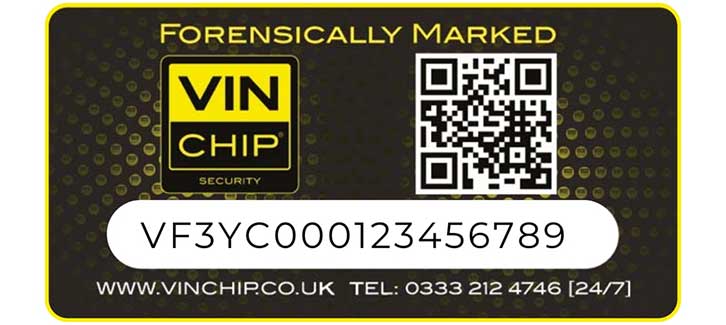
VIN CHIP® uses both visible and invisible markings containing a touring caravan’s unique 17 digit VIN. Touring caravan VIN’s will be displayed on tamper evident labels to deter criminals. Hidden electronic RFID chips, that are traceable by the Police for identification and recovery of stolen caravans, will also contain the VIN.
Customers can check if their caravan is protected by contacting 0333 212 4746 or visiting www.vinchip.co.uk for more details.
Insurance
It almost goes without saying that of all the excellent security devices featured here, the best form of defence is in fact your caravan insurance policy.
Caravan insurance isn’t a legal requirement in the UK, but it’s something we would always recommend taking out.
For any van, it’s important to have an appropriate level of cover from a specialist provider, one that really understands the specific needs of van owners.
It makes sense to use a firm that can provide plenty of good reviews, or one that has been recommended by friends and family. Buying insurance cover on price alone is definitely not the best approach when it comes to insuring a high-value item such as your caravan.
A specialist leisure vehicle insurance provider will make sure that a suitably high level of contents cover is included in your policy, and that other expensive items – such as ebikes or awnings (see: the best caravan awnings) – are also protected.
These items can sometimes be overlooked when you are taking out insurance for your tourer, but they are of great importance to caravanners, who will be carrying everything with them on tour – including the kitchen sink – as well as those caravan essentials.
So it’s important to make sure that before you sign on the dotted line, you read the small print carefully and check that every high-value item is listed on the policy schedule.
Verdict
Being aware that caravans are a target and being prepared is half the battle – you shouldn’t feel as though you have a target drawn on your back.
So long as you take a few practical precautions and have good insurance, you should be fine – and with a bit of care and forethought, you can give yourself a much better chance of beating the thieves.
Don’t forget to protect your tow car either – a useful aid here will be having the best steering wheel lock, as our guide explains.
Useful contacts
If you’ve enjoyed reading this article, why not get the latest news, reviews and features delivered direct to your door or inbox every month. Take advantage of our brilliant Practical Caravan magazine SUBSCRIBERS’ OFFER and SIGN UP TO OUR NEWSLETTER for regular weekly updates on all things caravan related.
